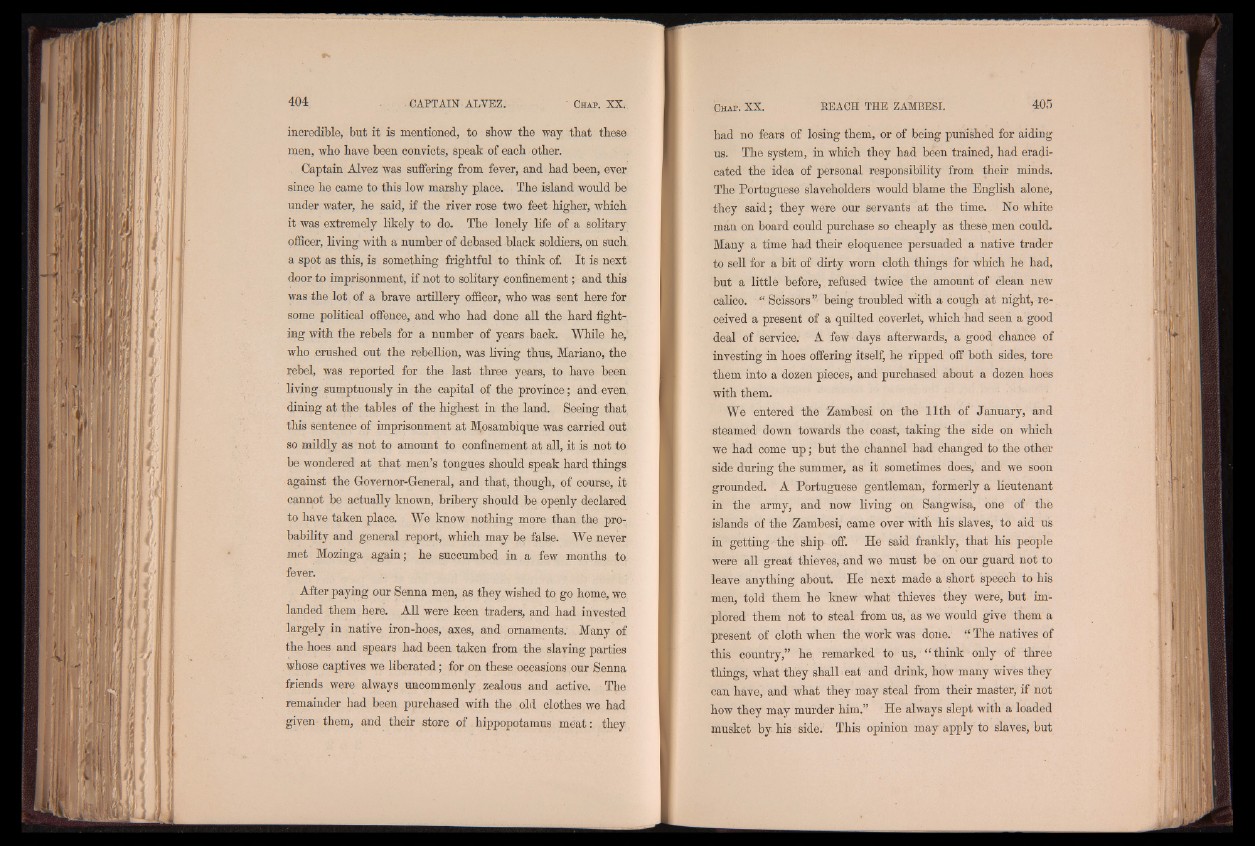
incredible, but it is mentioned, to sbow the way that these
men, who have been convicts, speak of each other.
Captain Alvez was suffering from fever, and had been, ever
since he came to this low marshy place. The island would be
under water, he said, if the river rose two feet higher, which
it was extremely likely to do. The lonely life of a solitary
officer, living with a number of debased black soldiers, on such,
a spot as this, is something frightful to think of. It is next
door to imprisonment, if not to solitary confinement ; and this
was the lot of a brave artillery officer, who was sent here for
some political offence, and who had done all the hard fighting
with the rebels for a number of years back. While he,
who crushed out the rebellion, was living thus, Mariano, the
rebel, was reported for the last three years, to have been
living sumptuously in the capital of the province ; and even
dining at the tables of the highest in the land. Seeing that
this sentence of imprisonment at Mosambique was carried out
so mildly as not to amount to confinement at all, it is not to
be wondered at that men’s tongues should speak hard things
against the Governor-General, and that, though, of course, it
cannot be actually known, bribery should be openly declared
to have taken place. We know nothing more than the probability
and general report., which may be false. We never
met Mozinga again; he succumbed in a few months to
fever.
After paying our Senna men, as they wished to go home, we
landed them here. All were keen traders, and had invested
largely in native iron-hoes, axes, and ornaments: Many of
the hoes and spears had been taken from the slaving parties
whose captives we liberated; for on these occasions our Senna
friends were always uncommonly zealous and active. The
remainder had been purchased with the old clothes we had
given them, and their store o f . hippopotamus meat: they
had no fears of losing them, or of being punished for aiding
us. The system, in which they had been trained, had eradicated
the idea of personal responsibility from their minds.
The Portuguese slaveholders would blame the English alone,
they said; they were our servants at the time. No white
man on board could purchase so cheaply as these men could.
Many a time had their eloquence persuaded a native trader
to sell for a bit of dirty worn cloth things for which he had,
but a little before, refused twice the amount of clean new
calico. “ Scissors” being troubled with a cough at night, received
a present of a quilted coverlet, which had seen a good
deal of service. A few days afterwards, a good chance of
investing in hoes offering itself, he ripped off both sides, tore
them into a dozen pieces, and purchased about a dozen hoes
with them.
We entered the Zambesi on the 11th of January, and
steamed down towards the coast, taking the side on which
we had come u p ; but the channel had changed to the other
side during the summer, as it sometimes does,’ and we soon
grounded. A Portuguese gentleman, formerly a lieutenant
in the army, and now living on Sangwisa, one of the
islands of the Zambesi, came over with his slaves, to aid us
in getting the ship off. He said frankly, that his people
were all great thieves, and we must be on our guard not to
leave anything about. He next made a short speech to his
men, told them he knew what thieves they were, but implored
them not to steal from us, as we would give them a
present of cloth when the work was done. “ The natives of
this country,” he remarked to us, “ think only of three
things, what they shall eat and drink, how many wives they
can have, and what they may steal from their master, if not
how they may murder him.” He always slept with a loaded
musket by his side. This opinion may apply to slaves, but